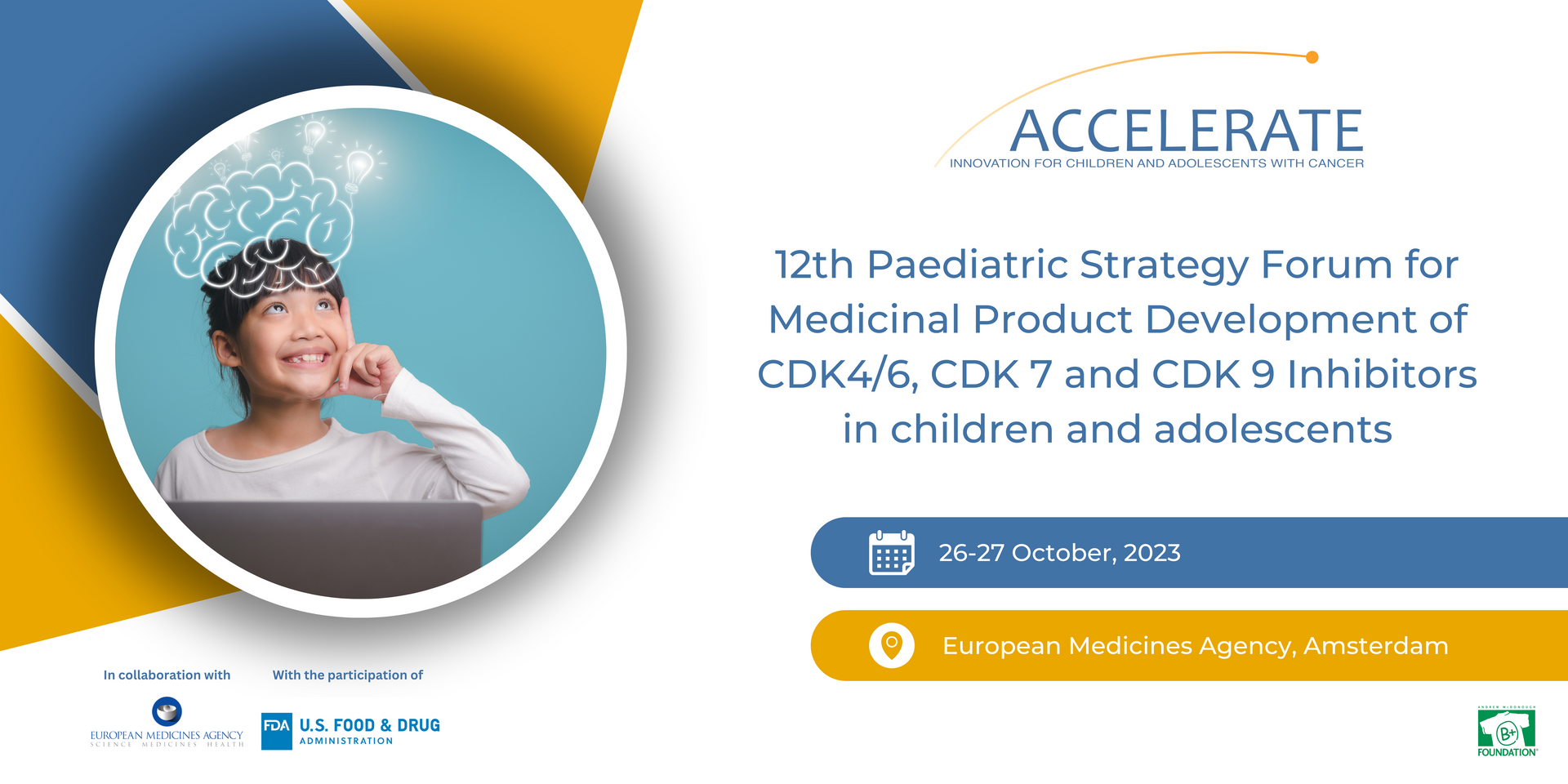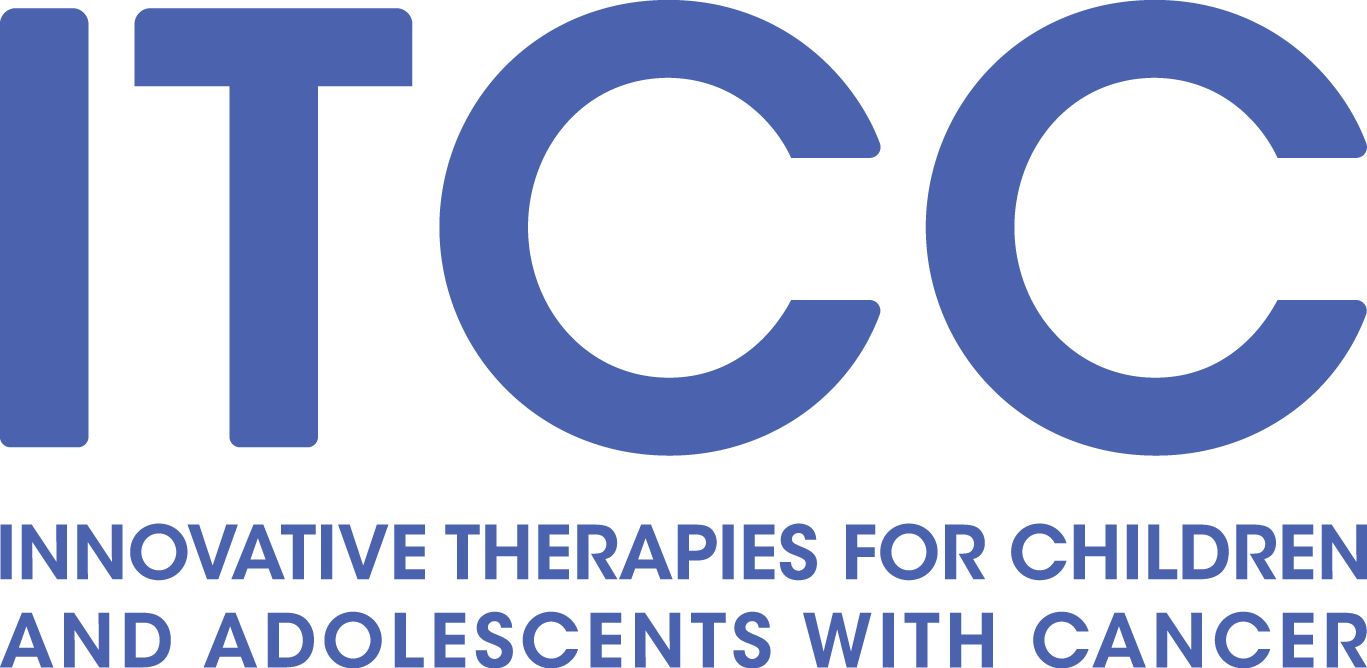
ACCELERATE in collaboration with the European Medicines Agency
With participation of the Food and Drug Administration
Deadline 30 June 2023
BACKGROUND AND OBJECTIVES
Paediatric Strategy Forums have been created to evaluate the current state of the science, facilitate dialogue, and provide an opportunity for constructive discussions between relevant stakeholders (patient advocates, clinicians, academics, biotechnology/pharmaceutical companies, and regulators) on specific topics in an open forum to assure development of medicines in the best interests of children and adolescents with cancer.
The goal of these meetings is to share information, to facilitate the development of innovative
medicines and ultimately their introduction into the standard-of-care of children with malignancies.
The Twelfth Multi-Stakeholder Paediatric Strategy Forum organised by ACCELERATE in collaboration with the European Medicines Agency (EMA) and with the participation of the U.S. Food and Drug Administration (FDA) will focus on CDK4/6, CDK7 and CDK9 Inhibitors.
The cyclin-dependent kinase (CDK) pathway is a series of complexes formed between cyclins and their associated kinases. This pathway, along with its inhibitors and regulators controls the orderly progression through each stage of the cell cycle. The abnormal activation of CDKs results in uncontrolled cancer cell proliferation and the induction of cancer stem cell characteristics.
CDKs 4 and 6 belong to the subgroup of CDKs that specifically regulate cellular transition from the G1 phase of the cell cycle to the S phase, and CDK4/6 inhibitors effectively block the proliferation of sensitive cancer cells by inducing G1 cell cycle arrest. CDK4/6 inhibitors are rapidly transforming the care of adult patients with hormone receptor positive, human epidermal growth factor receptor 2-negative advanced breast cancer. Genetic aberrations in paediatric tumours, including neuroblastoma and malignant rhabdoid tumours, increase CDK 4/6 activity and thus make this pathway an attractive therapeutic target. In paediatric oncology CDK4/6 inhibitors have been initially evaluated in monotherapy and more recently, in combination. There are currently 29 ongoing or completed trials with CDK4/6 inhibitors, of which 20 are in combination with other anticancer drugs. To date the efficacy of monotherapy has been largely disappointing and it is unclear which combinations to prioritise and what are relevant biomarkers.
The main function of another subgroup of CDKs is to control transcriptional processes and CDK9 is one of the most important transcription regulatory members of this subgroup. It controls many cellular functions including proliferation, survival, cell cycle regulation, DNA damage repair and metastasis. Substantial enhanced activity of CDK9 is observed in multiple cancer types, which is universally associated a worse prognosis. CDK9 inhibitors are early in development in adult and paediatric oncology.
In addition, CDK7 accomplishes dual functions in cell-cycle control and transcription and a number of selective small molecule inhibitors of CDK7 have been developed. The Forum will focus on CDK4/6, CDK7 and CDK9 inhibitors.
The Paediatric Strategy Forum aims to clearly ascertain the role of these pathway in paediatric cancer and review the relevant preclinical data. For CDK4/6 inhibitors the Forum will: i) review data for activity of monotherapy and combinations and ii) discuss the optimal combinations. For CDK7 and CDK9 inhibitors the aim will be to provide overview and to discuss their current and future development. The goal is to formulate a consensus between all stakeholders on how best to take forward the development of this class of products.
FORMAT
This forum will be held in person and all participants are strongly encouraged to attend it. For attendees unable to travel or if travel restrictions prevent an in person event, a virtual option will be available.
Forum Output: Publication of a summary and manuscript from all participants addressing the challenges and documenting the conclusions of the meeting. Potentially further specific meetings relating to areas which require more in-depth discussion will be arranged.
Participation: Possible only by invitation or by submitting an Expression of Interest before the 30 June 2023.
Invitations will be sent out by the end of July 2023.
The scientific manuscripts published in the European Journal of Cancer of the first nine Paediatric Strategy Forums held between 2017 and 2023 on ALK inhibition, mature B-cell malignancies, checkpoint inhibitors in combination, acute myeloid leukaemia, epigenetic modifiers, ALK inhibition and CAR T-cells, multi-targeted kinase inhibitors in bone sarcomas and MAPK pathway inhibitors - respectively can be found HERE.




